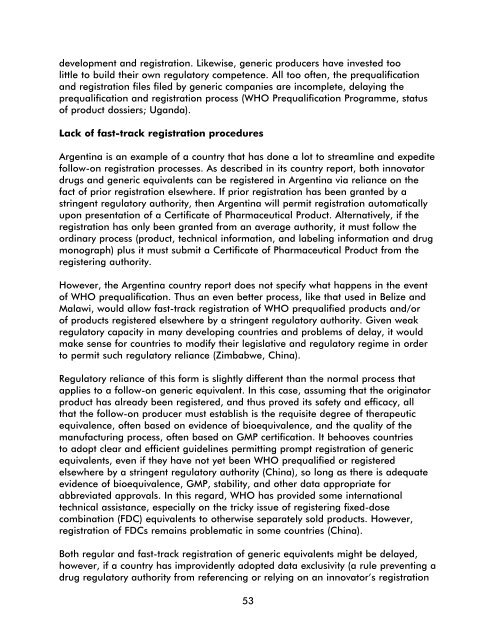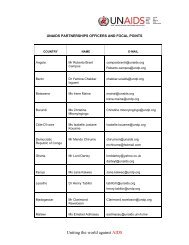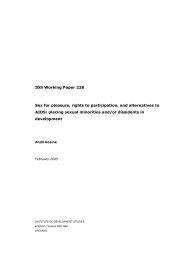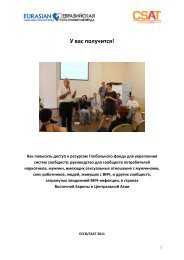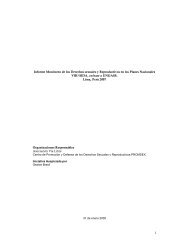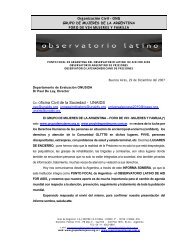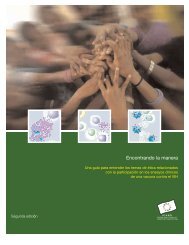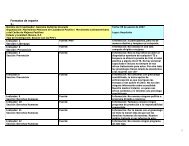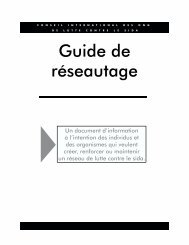development and registration. Likewise, generic producers have invested toolittle to build <strong>the</strong>ir own regulatory competence. All too often, <strong>the</strong> prequalificationand registration files filed by generic companies are incomplete, delaying <strong>the</strong>prequalification and registration process (WHO Prequalification Programme, statusof product dossiers; Uganda).Lack of fast-track registration proceduresArgentina is an example of a country that has done a lot to streamline and expeditefollow-on registration processes. As described in its country report, both innovatordrugs and generic equivalents can be registered in Argentina via reliance on <strong>the</strong>fact of prior registration elsewhere. If prior registration has been granted by astringent regulatory authority, <strong>the</strong>n Argentina will permit registration automaticallyupon presentation of a Certificate of Pharmaceutical Product. Alternatively, if <strong>the</strong>registration has only been granted from an average authority, it must follow <strong>the</strong>ordinary process (product, technical information, and labeling information and drugmonograph) plus it must submit a Certificate of Pharmaceutical Product from <strong>the</strong>registering authority.However, <strong>the</strong> Argentina country report does not specify what happens in <strong>the</strong> eventof WHO prequalification. Thus an even better process, like that used in Belize andMalawi, would allow fast-track registration of WHO prequalified products and/orof products registered elsewhere by a stringent regulatory authority. Given weakregulatory capacity in many developing countries and problems of delay, it wouldmake sense for countries to modify <strong>the</strong>ir legislative and regulatory regime in orderto permit such regulatory reliance (Zimbabwe, China).Regulatory reliance of this form is slightly different than <strong>the</strong> normal process thatapplies to a follow-on generic equivalent. In this case, assuming that <strong>the</strong> originatorproduct has already been registered, and thus proved its safety and efficacy, allthat <strong>the</strong> follow-on producer must establish is <strong>the</strong> requisite degree of <strong>the</strong>rapeuticequivalence, often based on evidence of bioequivalence, and <strong>the</strong> quality of <strong>the</strong>manufacturing process, often based on GMP certification. It behooves countriesto adopt clear and efficient guidelines permitting prompt registration of genericequivalents, even if <strong>the</strong>y have not yet been WHO prequalified or registeredelsewhere by a stringent regulatory authority (China), so long as <strong>the</strong>re is adequateevidence of bioequivalence, GMP, stability, and o<strong>the</strong>r data appropriate forabbreviated approvals. In this regard, WHO has provided some internationaltechnical assistance, especially on <strong>the</strong> tricky issue of registering fixed-dosecombination (FDC) equivalents to o<strong>the</strong>rwise separately sold products. However,registration of FDCs remains problematic in some countries (China).Both regular and fast-track registration of generic equivalents might be delayed,however, if a country has improvidently adopted data exclusivity (a rule preventing adrug regulatory authority from referencing or relying on an innovator’s registration53
data or even on <strong>the</strong> fact of prior registration in order to establish <strong>the</strong> safety andefficacy of <strong>the</strong> follow-on product). Cambodia was forced to adopt five years of dataexclusivity by <strong>the</strong> US in its WTO ascension agreement and China has been forcedto adopt six years. Likewise, <strong>the</strong> Dominican Republic has been forced to accept fiveyears of data exclusivity as part of <strong>the</strong> US-CAFTA-DR, which also included a linkageprovision restricting registration of patented products.Inefficiencies in special authorization proceduresFrequently, ARV treatment programs in developing countries need to make certainmedicines available to <strong>the</strong>ir patients even before <strong>the</strong>y have been registered ei<strong>the</strong>rby an innovator or generic producer. In many such cases, <strong>the</strong>re is not muchquestion that <strong>the</strong> product is safe and efficacious because it is already registered andin broad use elsewhere, both in developed and developing countries, and becauseit has <strong>the</strong>refore already gone through comparable regulatory processes to establishsafety, efficacy, and quality. When <strong>the</strong> product is not yet approved, <strong>the</strong>re needs tobe an easy-to-use temporary authorization process, which unfortunately is oftencumbersome and burdensome for both <strong>the</strong> producer and <strong>the</strong> treatment provider(Morocco, China). Accordingly, in addition to relying on WHO prequalificationor registration by a stringent regulatory authority for expedited registration/marketing-approval, countries could use <strong>the</strong> fact of prequalification or registrationto automatically grant special authorization for marketing and use prior to finalregistration.Lack of regulatory capacity, inefficiencies, and corruption in national drugregistrationPoor countries suffer in general from a lack of regulatory capacity, which extendsto <strong>the</strong> highly technical field of drug registration. Although some of <strong>the</strong> problemsof incapacity could be solved through forms of regional cooperation (see Belizereport describing quality assurance work done in Jamaica), WHO has had littlesuccess to date in organizing regional cooperation despite years of trying to doso. However, incapacity is not <strong>the</strong> only problem – registration processes are oftencomplex, slow, and costly (China, Morocco, Zimbabwe, and Uganda) which not onlydelays registration but actually deters companies from even attempting to register<strong>the</strong>ir products (China, Morocco). Complexities come in multiple forms; not only dopaperwork requirements differ, but in some instances <strong>the</strong>re are translation barriersand costs, including translation of required product labels (Dominican Republic). Interms of costs, not only are initial filing fees high, but in some instances <strong>the</strong>re areannual renewal fees (Zimbabwe), <strong>the</strong> non-payment of which can lead to productderegistration (Uganda). Some companies get around <strong>the</strong> delays by resortingto corruption, a danger exacerbated by low pay and lack of transparency within<strong>the</strong> registration authority. China experienced a major scandal in 2007 when <strong>the</strong>director of <strong>the</strong> China Food and <strong>Drug</strong> Administration was convicted for having soldregistration rights to unqualified manufacturers.54
- Page 1 and 2:
Missing the Target #5:Improving AID
- Page 4 and 5:
ArgentinaDr. María Lorena Di Giano
- Page 8 and 9:
Executive SummaryAt the G8 meeting
- Page 12: • UN agencies should provide incr
- Page 16 and 17: Price should not be a barrier when
- Page 18 and 19: The Global Fund and UNITAID: The Fu
- Page 20 and 21: The real cost of free treatmentBy a
- Page 22 and 23: Remaining work for asuccessful prog
- Page 24 and 25: DOMINICAN REPUBLICto access rapid t
- Page 26 and 27: DOMINICAN REPUBLICIn Santo Domingo
- Page 28 and 29: ZIMBABWEtreatment, representing 35
- Page 30 and 31: ZIMBABWEAccording to the Medicines
- Page 32 and 33: ZIMBABWEZimbabwe’s application fo
- Page 34 and 35: ZIMBABWENational government• Addr
- Page 36 and 37: RUSSIAMigrantsRussia, with the seco
- Page 38 and 39: a person with HIV will die very qui
- Page 40 and 41: FamiliesIn Kenya, families are the
- Page 42 and 43: INDIA2. Provide pediatric formulati
- Page 44 and 45: Linking nutrition and treatmentBy W
- Page 46 and 47: Most people living with advanced HI
- Page 48 and 49: only available in the capital, Yaou
- Page 50 and 51: ZAMBIAFindings in particular provin
- Page 52 and 53: The DACA for Chadiza District was a
- Page 54 and 55: Many health care workers are inadeq
- Page 56 and 57: DRUG REGISTRATION BARRIERS & LOGJAM
- Page 58 and 59: Country ATV RLPV/rLPV/r(HS)TDFArgen
- Page 62 and 63: Capacity issues and delays in the W
- Page 64 and 65: Lack of post-approval quality assur
- Page 66 and 67: ARV PROCUREMENT, REGISTRATION,AND S
- Page 68 and 69: ARGENTINAParallel importingRelating
- Page 70 and 71: ARGENTINAAccess to ARVsNo difficult
- Page 72 and 73: Viral load tests are available, but
- Page 74 and 75: Cambodiaby Mony PenOnly pharmacists
- Page 76 and 77: ChinaBy anonymous Missing the Targe
- Page 78 and 79: CHINAThe current process for regist
- Page 80 and 81: Dominican RepublicBy Eugene Schiff
- Page 82 and 83: IndiaBy Abraham KK, Celina D’Cost
- Page 84 and 85: MalawiBy Lot Nyirenda and Grace Bon
- Page 86 and 87: MALAWIStock-outsAccording to an ext
- Page 88 and 89: MoroccoBy Othman MelloukMorocco has
- Page 90 and 91: Determine the patent status of all
- Page 92 and 93: MOROCCOThe shortage occurred becaus
- Page 94 and 95: As of November 2007, the unit cost
- Page 96 and 97: NIGERIADiagnostic testsDiagnostic t
- Page 98 and 99: The government’s initial inabilit
- Page 100 and 101: Increase training and capacity buil
- Page 102 and 103: treatment practice. The Minster ann
- Page 104 and 105: Ugandaby Richard Hasunira, Prima Ka
- Page 106 and 107: UGANDAExtracts from the MoH’s rep
- Page 108 and 109: ZAMBIAIn gathering this information
- Page 110 and 111:
However, since manufacturing prices
- Page 112 and 113:
105SHORT SUMMARY
- Page 114:
PAKISTANAccess for marginalized gro


